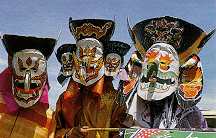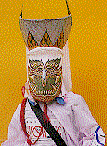
Phi Ta Khon Festival.
 Phi Ta Khon Festival. |
 |
| Information |
: Tourism Authority of Thailand, Tel. (02) 694-1222, E-mail : tat@cs.ait.ac.th : Tourist Service Center (TAT and Tourist Police), Tel. 1155 : Ghosts haunt the streets of Loei, Holiday Time in Thailand, Thailand's Official Tourism Magazine, June 1997, P. 49-51. |